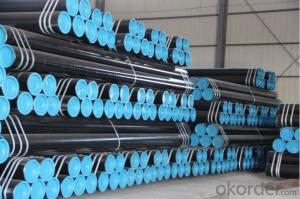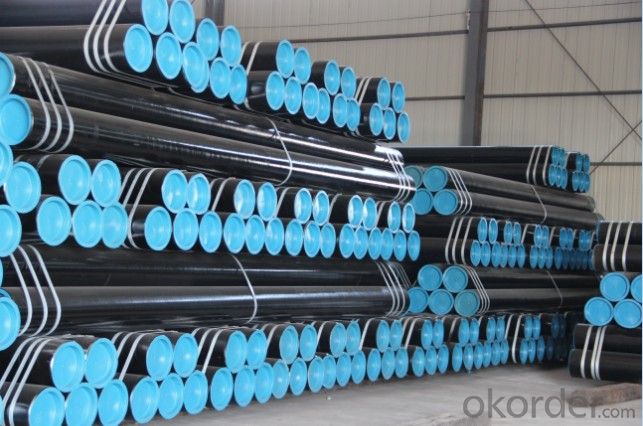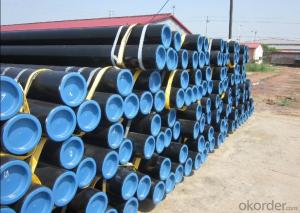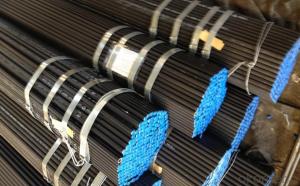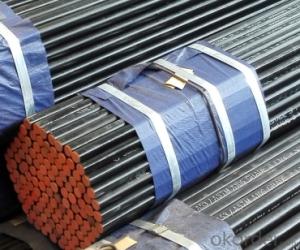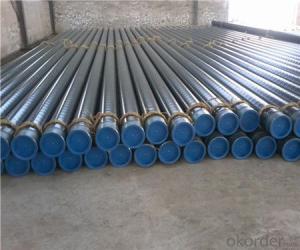Seamless pipe ASTM A53/ASTM A 106/API 5L
- Loading Port:
- Tianjin
- Payment Terms:
- TT OR LC
- Min Order Qty:
- 10 m.t.
- Supply Capability:
- 5000 m.t./month
OKorder Service Pledge
OKorder Financial Service
You Might Also Like
1. Commodity Name: Seamless steel pipe
2. Standard: API,GB,ASTM,ASME,DIN
3. Quality grade: 10#, 20#, A106B, A53B, API 5L B, Q235, Q345, ST37-2, ST 45, ST52.etc.
4. Dimension:
OD: 1/2"-24"
WT: 2.5-80mm, SCH10~SCH40~XXL
length: 5.8m,6m,8m,9m,12m
5. Technique: Hot Rolled/Cold Rolled/ Cold Drawn
6. application
carbon seamless steel pipes are widely used in gas, water and oil, transpotation;constructions;Bridge,highway,windows of model steel door; building materials;fences;heating facilities Fluid Pipe;conduit pipe,scaffolding pipe.etc.
7. Payment Terms: L/C D/A D/P T/T
8.packing and shipment
Packaged in bundles,as per customers' requirements, it can also bepackagesd as beveled ends, typed marking, black painting, plastic caps protection,woven bags packing
For 20" container the max length is 5.8m; For 40" container the max length is 12m. other options are available based on customer requests. Please discuss when placing orders.
9. Surface: painted with varnish;
10. Plastic caps at ends.
11. Tolerance: OD +1%/-1%
WT +12.5%/-10%
12. Chemical composition:
Models of Steel Pipes | Chemical Component | |||||||
Steel 20 (ASTM A106B) | C | Si | Mn | P | S | Cu | Ni | Cr |
0.17~0.24 | 0.17~0.37 | 0.35~0.65 | 0.035max | 0.035max | 0.25max | 0.25max | 0.25max | |
Steel45 (ASTM 1045) | 0.42~0.50 | 0.17~0.37 | 0.50~0.80 | 0.035max | 0.035max | 0.25max | 0.25max | 0.25max |
16Mn(Q345B) | 0.12~0.20 | 0.20~0.55 | 1.20~1.60 | 0.035max | 0.035max | 0.25max | 0.25max | 0.25max |
45Mn2 ( ASTM1345) | 0.42~0.49 | 0.17~0.37 | 1.40~1.80 | 0.035max | 0.035max | 0.3max | 0.3max | 0.30max |
- Q: How to descaling galvanized steel pipe?
- Galvanized steel tubes will not rust in principle.... Batch rust with weak acid water immersion, individual can use steel wire brush brush on it.
- Q: What is the shear strength of steel pipes?
- The shear strength of steel pipes can vary depending on various factors such as the grade of steel, size and thickness of the pipe, and any additional treatments or coatings applied. Generally, the shear strength of steel pipes is high due to the inherent strength of steel, making them suitable for various structural and industrial applications.
- Q: What is the difference between seamless and ERW steel pipes?
- Seamless steel pipes are manufactured without any welded joints, resulting in a continuous and strong structure. On the other hand, ERW (Electric Resistance Welded) steel pipes are created by welding the edges of the steel strip together to form a pipe. While seamless pipes offer better strength and durability, ERW pipes are more cost-effective and suitable for less demanding applications.
- Q: How do you determine the pipe schedule for steel pipes?
- Several factors, including pressure rating, wall thickness, and outer diameter, are taken into account to determine the pipe schedule for steel pipes. The pipe schedule serves as a standardized system that classifies the thickness of pipe walls, ensuring compatibility and safety in various applications. To ascertain the pipe schedule for steel pipes, one must consider the maximum pressure the pipe will endure, typically measured in pounds per square inch (psi) or bars. The pressure rating indicates the pipe's ability to withstand pressure without experiencing failure or leakage. Higher pressure ratings necessitate thicker pipe walls. Another crucial factor in determining the pipe schedule is the wall thickness, typically expressed in inches or millimeters. The wall thickness directly correlates with the pressure rating, as thicker walls have the capacity to handle higher pressures. The American National Standards Institute (ANSI) has established a set of standardized wall thicknesses for steel pipes known as the "pipe schedule." The outer diameter of the pipe is also taken into consideration when determining the pipe schedule. The specific application and requirements influence the outer diameter variation. Selecting a pipe with the appropriate outer diameter is essential to ensure proper fit and compatibility with fittings, valves, and other components. In conclusion, the pipe schedule for steel pipes is determined by examining the maximum pressure, wall thickness, and outer diameter. By aligning these factors with the suitable pipe schedule, one can guarantee that the steel pipe is appropriate for its intended usage and capable of withstanding the required pressure.
- Q: What is DN50 for welded pipe?
- Commonly used in the market DN50 seamless steel pipe, the outer diameter has two specifications: A, 57mm, B, 60mm, if no special instructions, commonly used is 57mm. The outer diameter of the welded pipe is only 60mm this specification.
- Q: How do you connect steel pipes together?
- Various industries commonly employ several methods to connect steel pipes together. One frequently utilized technique is welding, which involves the heating of the steel pipe ends and their subsequent joining using a welding rod or wire. This method results in a robust and enduring connection that can withstand high pressures and temperatures. Threading, another method, entails cutting threads into the ends of the steel pipes. These threaded ends can then be screwed together using pipe fittings such as couplings or unions. Threading is particularly advantageous for smaller diameter pipes as it allows for easy disassembly and reassembly. Flanges also serve as a means to connect steel pipes. These flat, circular discs with holes can be bolted together, providing a secure connection. Flanges are especially suitable for large diameter pipes or those that require frequent disconnection for maintenance or repairs. Pipe fittings, such as couplings, tees, elbows, or reducers, can also be employed for connecting steel pipes. These fittings, typically composed of steel or other materials, are designed for welding, threading, or utilizing other connection methods like grooving or compression. It is important to consider various factors, such as pipe size, application, required strength, and adherence to industry standards or codes, when selecting the appropriate method for joining steel pipes. Consulting with a qualified professional or referring to industry-specific guidelines is essential in making this decision.
- Q: What are the factors to consider when selecting pipe materials for high-temperature applications?
- When selecting pipe materials for high-temperature applications, it is important to consider factors such as the maximum operating temperature, corrosion resistance, thermal expansion properties, mechanical strength, and cost. The chosen material should be able to withstand the anticipated temperature without deformation or degradation, resist corrosion from the process fluid or environment, have a low coefficient of thermal expansion to minimize stress on the pipe, possess sufficient mechanical strength to handle the pressure and load, and be cost-effective for the specific application.
- Q: Are steel pipes suitable for underground installations in areas with high moisture content?
- Steel pipes are generally suitable for underground installations in areas with high moisture content. However, there are certain factors to consider when using steel pipes in such conditions. Corrosion is a major concern when steel pipes are exposed to moisture for extended periods. To mitigate this risk, it is important to use steel pipes that are specifically designed for underground installations and are coated with protective materials such as epoxy or polyethylene. These coatings act as a barrier between the steel and the surrounding moisture, preventing corrosion and extending the lifespan of the pipes. Additionally, proper installation techniques, including adequate pipe bedding and backfilling, should be followed to ensure the pipes are properly supported and protected from external forces. Regular inspection and maintenance are also recommended to identify any signs of corrosion or damage and address them promptly. Overall, with the right precautions and maintenance, steel pipes can be a suitable choice for underground installations in areas with high moisture content.
- Q: What are the main components of a steel pipe?
- The main components of a steel pipe include the steel material itself, which is typically made from carbon and alloy steel, as well as various coatings or linings that can be applied to enhance its durability and resistance to corrosion. Additionally, a steel pipe may also have fittings such as flanges or couplings, and may be further reinforced with supports or braces depending on its intended use.
- Q: Can steel pipes be used for industrial ventilation systems?
- Yes, steel pipes can be used for industrial ventilation systems. Steel pipes are commonly used in such systems due to their durability, resistance to high temperatures, and ability to handle high airflow volumes. They are also cost-effective and can be easily fabricated to meet specific requirements of an industrial ventilation system.
Send your message to us
Seamless pipe ASTM A53/ASTM A 106/API 5L
- Loading Port:
- Tianjin
- Payment Terms:
- TT OR LC
- Min Order Qty:
- 10 m.t.
- Supply Capability:
- 5000 m.t./month
OKorder Service Pledge
OKorder Financial Service
Similar products
Hot products
Hot Searches
Related keywords
